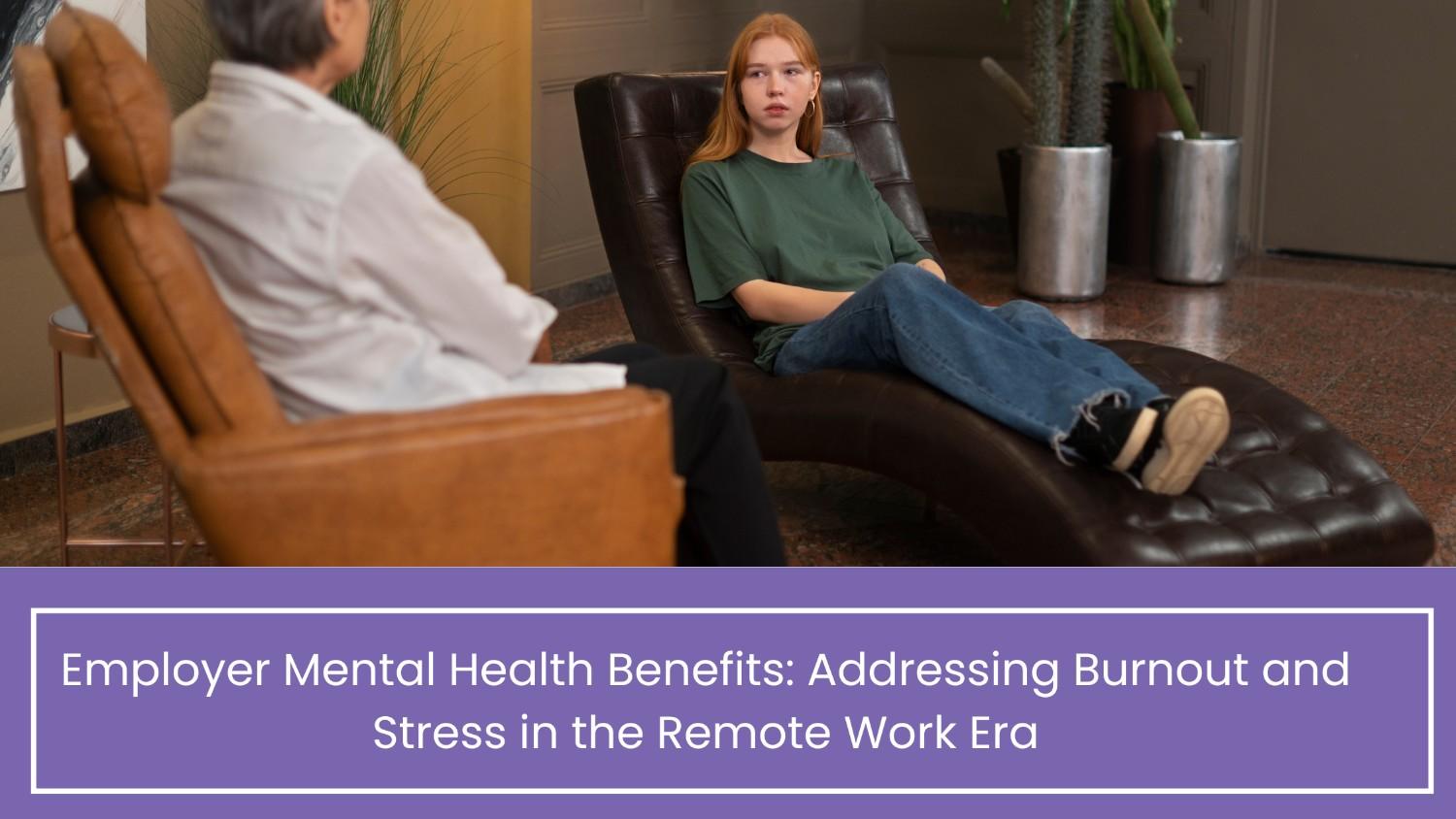Employer Mental Health Benefits: Addressing Burnout and Stress in the Remote Work Era
In the dynamic healthcare field, there is a startling increase in the stress and burnout of remote employees. In 2023, a study by the American Psychological Association stated that almost 75% of remote workers experienced burnout, with more than 60% citing high stress levels compared to their in-office counterparts. This highlights the urgent demand for adequate mental health support in remote areas. As more organizations realize the importance of employee mental health, they are becoming more flexible with working arrangements.
It is crucial to combat burnout and stress among remote staff with proper mental health benefits provided by the employer. These benefits include mental health days, wellness programs, and virtual counseling. When employees feel supported for their mental health and have proper resources to manage it, they are more likely to be satisfied with their work and more productive and engaged.
Nevertheless, acknowledging mental health in workspaces has a proactive effect on staff retention as it reduces severe burnout and chronic stress. This, in turn, helps nurture a healthy and resilient work environment. Investing in mental health benefits is not just a compassionate step but a strategic one that improves the overall performance and morale of healthcare firms.
Table of Contents
Delving into Burnout and Stress in Remote Work
Burnout is a mental state of exhaustion due to overwhelmed emotions, prolonged stress, excessive tiredness, and mental drainage, which stops a person from further moving or making decisions. In remote workspaces, burnout occurs in employees due to multiple reasons including emotional isolation, inability to distinguish personal and work life, absence of physical boundaries between home and office, prolonged working hours, lack of motivation, and fewer opportunities for relaxation. Symptoms of burnout include irritability, a sense of work detachment, plummeted work performance, and chronic fatigue.
Stress, on the other hand, is our bodily response to any challenge and difficult situation. It can be chronic or acute. Acute stress is a reaction to short-lived or momentary challenges, like meeting stringent deadlines. It generally subsides once the challenge is resolved. Chronic stress is associated with prolonged bodily response to ongoing situations or challenges or even uncertainty, which can result in significant mental health damage, especially for remote workers. The persistent anxiety and tension could eventually blur the line between home and office, profoundly impacting physical health. Depression, anxiety, insomnia, and headaches often accompany chronic stress.
A recent survey conducted by Flex Jobs suggests that 75% of remote workers reportedly experienced chronic burnout and stress at some point. Forty percent stated that it was exacerbated during the pandemic. The shift to remote work comes with the serious drawback of mental health issues. Another study by the World Health Organization indicates that remote employees are 25% more likely to experience anxiety and stress compared to in-office employees. These statistics highlight the seriousness of the mental health crisis among remote work employees, emphasizing the need for proactive steps to address and navigate these challenges.
Impactful Mental Health Benefits for Remote Workers
Counseling and Therapy Services: Providing remote employees access to therapy and counseling sessions is crucial for enhancing their mental health. Virtual sessions help alleviate physical barriers like commuting time and geographical restrictions, making it easier for remote staff to seek support when needed. Such sessions can help employees navigate various mental health issues, stress factors, anxiety, trauma, or depression. By offering convenient support in a confidential environment, employers demonstrate their dedication to staff well-being, fostering an open and supportive work environment.
Mental Health Days: Mental health days are specially designated off days for employees to focus on mental well-being and self-care, without any work burden or responsibilities. Such days are essential for remote staff to recharge and avoid burnout. By promoting mental health days, employers show their support for maintaining sanity and well-being while also valuing physical health. This anticipatory approach promotes prolonged employee retention and reduces absenteeism in the workplace.
Wellness Programs: Implementing wellness initiatives customized for remote staff can profoundly reduce stress and enhance overall mental well-being. Programs including mindfulness, relaxation techniques, fitness programs, nutritional counseling, and more will help promote relaxation, reduce anxiety, improve physical health and activity, and support healthy eating habits. These programs contribute to both physical and mental well-being, offering significant opportunities for employees to relieve stress and focus on personal development. By offering distinct wellness programs, employers enable remote staff to prioritize their mental and physical health to achieve a seamless work-life balance.
Flexible Work Schedules: Another powerful method to alleviate burnout and stress among remote staff is flexibility in work hours. Employers need to understand that remote workers often juggle multiple responsibilities like chores, caregiving, and other personal commitments. Enabling a flexible work environment in terms of when and how work is done helps better manage workloads and personal life. This approach reduces the ongoing pressure to be always available during traditional work hours, empowering and trusting employees, thereby improving job satisfaction and productivity. Flexibility in work hours also allows employees to determine their peak productivity and energy times, enabling them to focus and be effective during those times.
Implementing Mental Health Benefits in a Remote Work Environment
Assessing Employee Needs: To efficiently foster the positive mental well-being of remote workers, employers must conduct anonymous surveys, regular check-ins, and focus groups to gather feedback. Collaborating with mental health professionals to analyze data and identify unique stressors and areas of concern is essential.
Choosing the Right Benefits: Provide a mix of platforms like virtual counseling, mindfulness programs, physical wellness initiatives such as fitness and nutrition classes, and Employee Assistance Programs (EAPs). Ensure that the resources are flexible, easily accessible, and most importantly, confidential to meet various needs.
Promoting and Communicating Benefits: Utilize multiple communication channels including internet portals and email newsletters to share information on mental health benefits. Create seamless and easy-to-navigate guidelines and educate managers to identify signs of mental health concerns and communicate via available platforms.
Creating a Supportive Culture: Foster a work environment where the mental health of employees is prioritized and ensure that staff feel safe discussing their concerns. Managers must acknowledge mental health topics, enhance work-life balance, and foster peer networks for support, leading to a more engaged and effective workplace.
Partnering with Practolytics for Comprehensive RCM Solutions
Choosing the right RCM partner is crucial for healthcare organizations aiming to optimize operations and enhance financial performance. Practolytics offers tailored RCM solutions that streamline administrative processes, improve revenue cycle efficiency, and ensure compliance with healthcare regulations. By partnering with Practolytics, healthcare practices can focus on delivering exceptional patient care while benefiting from optimized financial outcomes and operational excellence.
Investing in mental health benefits not only supports the well-being of healthcare professionals but also cultivates a productive and resilient workforce. Contact Practolytics today to learn more about our customized RCM solutions and how we can support your practice’s success.
ALSO READ – How to Bill for Mental Health Services: A Beginner’s Guide
Talk to Medical Billing Expert Today — Get a Free Demo Now!






